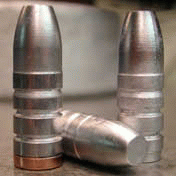one of us

| Quote:
Do you really think you can stir beeswax or oil under the surface of molten lead with a spoon?
Nope. Nor do I think that's important. Fluxing is a surface phenomenon.
And nowadays I seldom flux at all when using clean ingots in the electric pot indoors. I flux lots when melting dirty alloy in bulk outdoors with the turkey fryer, often using copious amounts of used motor oil and letting it blaze. Can't do that under the back deck, though, it turns it black. |
| | | Posts: 1325 | Location: Bristol, Tennessee, USA | Registered: 24 December 2003 |   IP
IP
|
|
one of us
| For several years I haven't fluxed at all, and I've had no problems. An article in _The Fouling Shot_ (I think) pointed out that the tin and antimony were in solution and not affected by flux. I simply skim the floating trash and cast lots of good bullets. |
| | | Posts: 108 | Location: Northcentral Louisiana | Registered: 06 February 2004 |   IP
IP
|
|
one of us
| The way i flux anymore, is with a dry piece of wooden dowel. It being carbon based, works dual purposes, of fluxing, and adding the advantage of being able to scrape on the sides of the pot, and actually getting your flux completely to the bottom of the alloy, rather than just on the top, as most methods of fluxing do. Think about it. Do you really think you can stir beeswax or oil under the surface of molten lead with a spoon? I doubt it, unless specific gravity functions in a different manner where you are, than it does around these parts. The stick, along with kitty litter, keeps me a happy caster. |
| | | Posts: 922 | Location: Somers, Montana | Registered: 23 May 2002 |   IP
IP
|
|


 The Accurate Reloading Forums
The Accurate Reloading Forums  THE ACCURATE RELOADING.COM FORUMS
THE ACCURATE RELOADING.COM FORUMS  Guns, Politics, Gunsmithing & Reloading
Guns, Politics, Gunsmithing & Reloading  Cast Bullets
Cast Bullets  Re: Best Flux?
Re: Best Flux?










